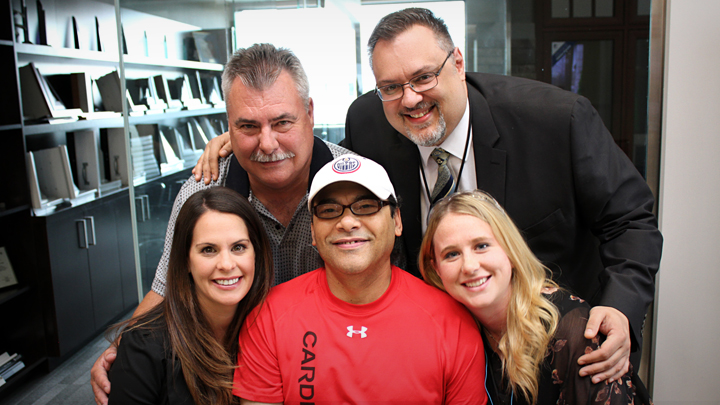
July 22, 2016

Cardiac-arrest survivor Manny Rodriguez, centre, is surrounded by the co-workers who saved his life, from left: Beth Marsh, Dale Moan, Nilos Korodimas and Rebekah Butler.
Story and photo by Shelly Willsey
EDMONTON — Two months after experiencing a cardiac arrest, Manny Rodriguez returned to All Weather Windows to say “thank you” to the colleagues who saved his life.
“My doctors said I’m alive because they reacted so quickly,” says the 53-year-old. “I owe them my life.”
On May 16, the Edmonton man arrived early to his shift as an inbound supervisor. Shortly after, he collapsed and turned blue.
As they rushed to his aid, Rodriguez’s co-workers grabbed the company’s emergency crash bag of medical supplies with its Automated External Defibrillator (AED) and called 911.
As Beth Marsh and Rebekah Butler performed CPR, Nilos Korodimas and Dale Moan controlled the scene and waited for the ambulance to escort the paramedics to Rodriguez.
During CPR, the AED was positioned on Rodriguez’s chest and used to shock his heart twice before the paramedics arrived to continue treatment for a cardiac arrest.
To recognize the four heroes’ quick thinking and action, Alberta Health Services’ Emergency Medical Services (EMS) presented them with Citizen Recognition Awards.
“Their preparedness and immediate response undoubtedly saved Manny’s life,” says Alex Campbell, EMS Public Education Officer.
“Saving the life of someone in cardiac arrest is a team effort. Early bystander CPR is the critical link in the chain of survival because your chance of surviving a cardiac arrest drops drastically for every minute that passes with no activity.”
Statistics from the Heart and Stroke Foundation show that current survival rates for cardiac arrest are very low; it’s estimated that only five per cent of Canadians survive a cardiac arrest outside of a hospital setting. For every minute that defibrillation is delayed during cardiac arrest, the odds of survival drop by seven to 10 per cent. Resuscitation is rarely successful beyond 10 minutes.
“This case is such a great example of a workplace having a plan in place and the staff acting on it,” adds Campbell. “We would encourage all workplaces to review and practise their medical event plans on a regular basis.”
All AEDs can be registered with heart-safe.ca. The service lets EMS dispatchers know where the AEDs are located, provides notifications for pad or battery expiration dates and gives guidelines on where to put an AED as well as making or changing an emergency response plan.